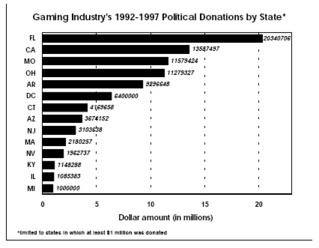The impact of political contributions is unclear. Neither the gaming industry nor its opponents have had the impact of their contributions examined. Mother Jones magazine recently conducted a study to determine the extent of the gaming industry’s political spending*. Investigators estimated dollar amounts of political spending for 32 states plus Washington D.C. These estimates were based on either searching databases or retreiving other sources of data. No data on political spending was available for the other 18 states. This study found that a total of $100 million dollars has been spent on political contributions in the past five years by a wide range of gaming interests, including corporate gaming interests, local developers, and Indian tribes. A contribution could be, for example, financing a campaign to support or defeat a bill, lobbying in the state capitol, or creating state Political Action Committees. The figure below lists the total contributions by the gaming industry within each state in which $1 million or more has been donated. Mother Jones comments that the state totals and the grand total are conservative estimates because of the data collection method. The limitations of the data collection include 1) disclosure laws which result in underestimates of contribution totals (e.g., in Mississippi contributions under $500.01 are not recorded), 2) discrepancies between total contribution reported in the state database and other state totals, and 3) inconsistent sources of data (e.g., campaign finance Web sites, reports from state officials, studies by public policy groups, local news sources). Social scientists have not yet determined the impact of the gaming industry’s spending on the public’s attitudes and perceptions of gambling. The Mother Jones report challenges social scientists to investigate whether the gaming industry contributions have a positive, negative, or neutral effect. This will be a difficult task since the little data that is available on contributions may be compromised or misleading. One specific hypothesis that can be tested in the future is that the states attracting the largest amount of political contributions by the gaming industry represent states in which the pro/antigambling conflict is the most escalated.
Sources: *The following articles can be found on websites http://bsd.mojones.com/coinop_congress/easymoney/lynch/html or http//www.mojones.com: Lynch, A. (1997). A stacked deck; Lynch, A. (1997). Profitable payoffs?; Hammond, K. (1997, June 9). Heavy betting.
This public education project is funded, in part, by The Andrews Foundation.





